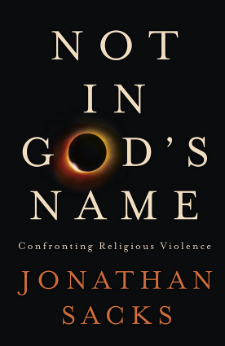Not in God’s Name by Jonathan Sacks
A compelling analysis of the tension that exists between the three Abrahamic faiths of Judaism, Christianity and Islam
 Not in God’s Name: Confronting Religious Violence
Not in God’s Name: Confronting Religious Violence
By Jonathan Sacks
Hodder and Stoughton
ISBN 978-1-473 61653 0
Reviewed by Martin Poole
'Imagine…..Nothing to kill or die for and no religion too.' Jonathan Sacks has the same imagination of a world at peace, but without the need to dispense with religion which he maintains has the capacity to accomplish the vision.
He faces head on the implied criticism in John Lennon’s lyrics but maintains clearly that the roots of conflict lie within our “groupiness”. That is the seeming inherent desire to be part of a bigger group – kin, family, tribe, nation creating at every level a Them and Us dichotomy. This quickly degenerates into Us good and Them bad.
Conflict follows and is aided by finding a scapegoat which too often has become the Jewish people. However, this is not primarily a book about antisemitism but rather a compelling analysis of the tension that exists between the three Abrahamic faiths of Judaism, Christianity and Islam.
Essentially Jonathan sees the Crusades, Holocaust, and ISIS as violent expressions of sibling rivalry, and devotes considerable space to a keen, detailed and fascinating exegesis of Genesis showing the origins of these schisms. He goes further by suggesting a careful reading of the familiar stories of Cain and Abel, Isaac and Ishmael, Jacob and Esau in particular can present God’s solution to a warring world. He believes that while God does choose – he does not reject. 'To be secure in my relationship with God does not depend on negating the possibility that others too may have a relationship with him.'
Jonathan admits that there are hard texts – not least the conquest of Canaan – which seem to promote violence, but he is quite emphatic that any passages when read literally are capable of leading to violence and hate, must be reinterpreted.
There are powerful words about the need for role reversal which seeks to put oneself in the place of the stranger, and the suggestion that the story of Joseph demonstrates how reconciliation between the brothers occurs only after the brothers had been subjected to similar deprivations as had Joseph. The injunction to – 'remember you were slaves in Egypt' (Ex 22:21) is an exhortation to see things from the perspective of the other.
There is a beautiful moment in the book when Jonathan calls for religion to relinquish its quest for power. 'It is then that it takes its place, not among the rulers but among the ruled, not in the palaces of power but in real lives of ordinary men and women who become extraordinary when brushed by the wings of eternity.'
This book gives us much to ponder and not all will sit easily with the Christian. Perhaps embracing the role reversal thinking we can understand Jonathan's summary dismissal of the New Testament assertion of Christians being the inheritors of the Abrahamic covenant. We can also understand, while not necessarily agreeing, that 'the principle of One God, One truth, One way does not make for peace in a world where people have other ways'.
However we can surely agree unequivocally that the violence we see today can never be “In God’s name”, and we live at such a time where this message, cogently set out by Jonathan, must be embraced and broadcast with urgency by all believers.
The Revd Martin Poole (retired Baptist Minister having served churches in Penarth, Godalming and Eastleigh)
Baptist Times, 23/03/2017